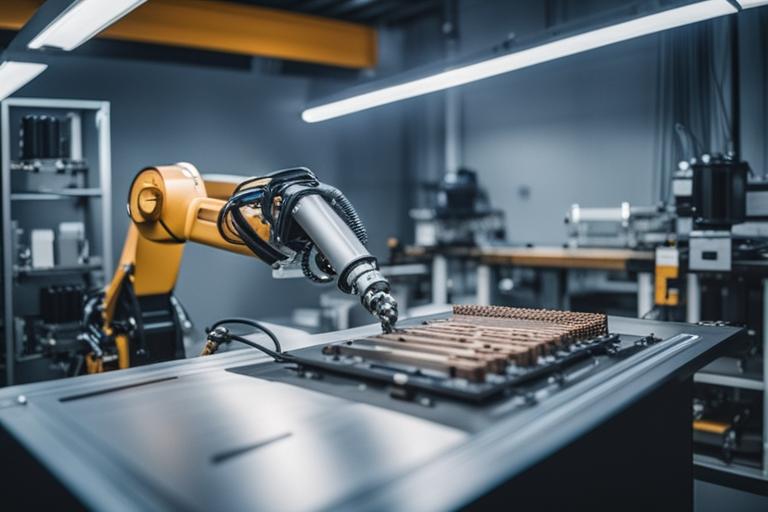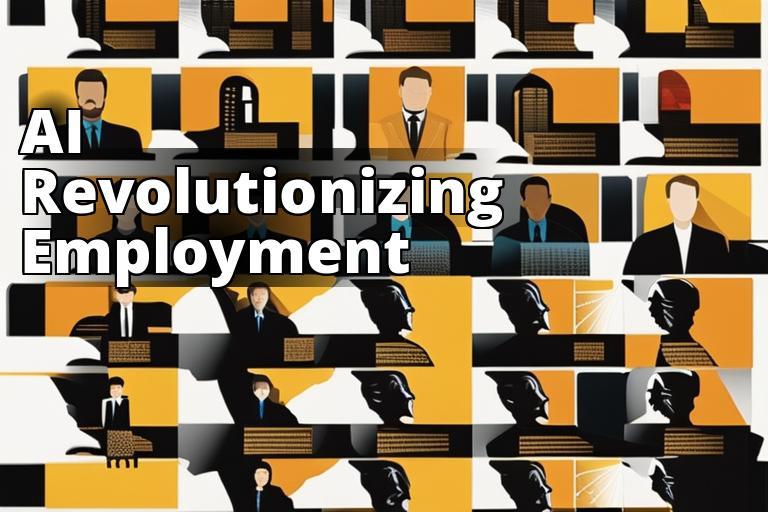Contents hideWhat You Will Learn About AI Software’s Impact on Job Roles and Employment
- AI’s automation of tasks and processes in various industries
- Changes in job roles and employment due to AI integration
- Strategies for embracing AI changes in the workplace
How does AI software impact job roles and employment? Artificial Intelligence (AI) software has revolutionized numerous industries, from healthcare and finance to manufacturing and marketing. Its impact on job roles and employment is a topic of growing significance in today’s rapidly evolving technological landscape. This article aims to delve into the profound changes brought about by AI software, exploring both its positive and negative implications for job roles and employment.

Automation and AI Software
Understanding the extent of tasks and processes being automated by AI
AI software encompasses a wide array of technologies that enable machines to perform tasks that typically require human intelligence. This includes the automation of repetitive and labor-intensive processes, data analysis, and complex problem-solving.
Real-world examples of AI-driven automation in different sectors
In healthcare, AI software is used for medical imaging analysis, predictive analytics for patient outcomes, and drug discovery. In manufacturing, robotics and AI-driven systems streamline production processes. The finance industry leverages AI for fraud detection, risk assessment, and algorithmic trading.
Efficiency and accuracy improvements through AI automation in the workplace
AI-driven automation leads to enhanced efficiency and accuracy, reducing human error and enabling organizations to optimize resources and focus on higher-value tasks.

Changes in Job Roles Due to AI Integration
Examining the transformation of job roles driven by AI integration
The integration of AI software has reshaped job roles across diverse sectors, leading to the emergence of new roles, the evolution of existing ones, and the automation of routine tasks.
The scale of AI’s impact on employment and workforce dynamics
AI’s impact extends beyond specific job roles, influencing workforce dynamics, organizational structures, and the nature of employment itself.
Statistics highlighting the evolving landscape of job roles in the age of AI
According to a study by the World Economic Forum, it is estimated that by 2025, AI and automation will displace 85 million jobs but create 97 million new roles, underscoring the transformative nature of AI on employment.
References:
- The World Economic Forum’s study provides valuable insights into the evolving job landscape due to AI and automation.
| Positive Impact of AI on Job Roles | Examples |
|---|---|
| Increased efficiency and productivity in AI-augmented roles | Streamlined processes, improved productivity |
| Enhanced decision-making and problem-solving abilities through AI | Data-driven decision-making, complex problem-solving |
| The potential for creating new job roles and career paths in AI-related fields | New career opportunities in data science, machine learning engineering, AI ethics |
Positive Impact of AI on Job Roles
Increased efficiency and productivity in AI-augmented roles
AI augments human capabilities, leading to improved productivity, streamlined processes, and the ability to handle complex tasks more efficiently.
Enhanced decision-making and problem-solving abilities through AI
AI software empowers professionals to make data-driven decisions, solve intricate problems, and uncover insights that were previously inaccessible.
The rise of AI has created new career opportunities in fields such as data science, machine learning engineering, and AI ethics, reflecting the dynamic nature of the job market.
Negative Impact of AI on Job Roles
Potential job displacement and unemployment due to AI integration
The integration of AI software has raised concerns about job displacement, particularly for roles that are susceptible to automation.
Skill obsolescence and the need for continuous learning to adapt to AI changes
Workers face the challenge of skill obsolescence as AI reshapes job requirements, necessitating continuous learning and upskilling to remain relevant in the workforce.
Certain demographics, such as older workers or those in traditionally manual labor-oriented roles, may face greater challenges in adapting to the changes brought about by AI integration.

Reskilling and Upskilling in the Age of AI
The importance of reskilling the workforce to adapt to AI integration
Reskilling programs are essential to equip the workforce with the skills needed to thrive in an AI-driven environment, fostering adaptability and resilience.
Educational institutions and organizations offer programs focused on upskilling individuals in areas such as data analysis, machine learning, and AI development.
The role of governments and organizations in facilitating reskilling efforts to mitigate job displacement
Governments and companies play a pivotal role in supporting initiatives that enable workers to reskill and transition into emerging job roles, mitigating the potential negative impact of AI on employment.

New Job Roles and Opportunities in AI
Emerging job roles include AI specialists, robotics process automation (RPA) developers, and AI solution architects, reflecting the growing demand for specialized AI expertise.
Professionals with expertise in AI, machine learning, and data science are highly sought after, underlining the increasing demand for specialized skill sets in the AI domain.
Entrepreneurial opportunities and career paths in the evolving AI ecosystem
The evolving AI ecosystem offers entrepreneurial opportunities for individuals to innovate and create AI-driven solutions, contributing to economic growth and technological advancement.

Ethical Considerations in AI and Employment
Addressing bias and fairness in AI-based decision-making in the workplace
Ethical considerations are crucial in ensuring that AI-driven decisions are fair, unbiased, and aligned with societal values, necessitating robust ethical frameworks and oversight mechanisms.
Privacy concerns and implications in the age of AI and employment
AI raises concerns about data privacy and security, prompting the need for stringent measures to safeguard sensitive information in the context of employment and workforce management.
Ensuring transparency, accountability, and ethical use of AI technologies in job roles and employment
Transparency and accountability are essential in the deployment of AI technologies, necessitating clear guidelines and ethical standards to govern their use in job roles and employment contexts.
Adapting to Change
In my previous role as a marketing manager, I experienced firsthand the impact of AI integration on job roles. As our company adopted AI software for data analysis and customer segmentation, my responsibilities shifted from manual data crunching to interpreting and implementing insights generated by the AI algorithms.
Embracing Upskilling Opportunities
Initially, the prospect of AI automating aspects of my role was daunting. However, I seized the opportunity to upskill in areas such as interpreting AI-generated analytics and leveraging them for targeted marketing strategies. This proactive approach not only enhanced my value within the company but also opened doors to new career opportunities in the burgeoning field of AI-driven marketing.
Furthermore, the ethical considerations of using AI to influence consumer behavior became a focal point of discussions within our team. We had to ensure that our AI-driven strategies were ethically sound and aligned with customer privacy regulations, adding a new layer of complexity to our decision-making processes.
This personal journey underscores the importance of embracing change, proactively upskilling, and navigating the ethical considerations brought about by AI integration in job roles.
Strategies for Embracing AI Changes in the Workplace
Business strategies for integrating AI while retaining and evolving human talent
Organizations need to develop strategies that blend AI integration with the preservation and evolution of human talent, fostering a harmonious coexistence of human and AI capabilities.
Personal development, career planning, and continuous learning in the AI era
Individuals should prioritize personal development, career planning, and continuous learning to adapt to the evolving demands of AI-integrated job roles.
A culture of adaptability and lifelong learning is crucial in navigating the changes brought about by AI, enabling individuals and organizations to thrive in an ever-evolving landscape.
In conclusion, the impact of AI software on job roles and employment is multifaceted, encompassing both positive and negative implications. As AI continues to evolve, understanding and adapting to its effects on the workforce will be essential for individuals, organizations, and policymakers alike.
Questions & Answers
How does AI software affect job roles?
AI software can automate tasks, changing job roles.
What are the effects of AI on employment?
AI can lead to job displacement and creation.
How can businesses adapt to AI in job roles?
Businesses can retrain employees for new AI-based tasks.
Who is most affected by AI in job roles?
Workers in routine-based jobs are most impacted.
What about the concern of AI replacing jobs?
AI may eliminate some jobs, but can also create new ones.
How can individuals prepare for AI’s impact on jobs?
Developing skills in AI-related fields can help.
With a Ph.D. in Artificial Intelligence and Robotics from Stanford University, Samuel Bennett is a leading expert in the field of AI and its impact on the workforce. Having published numerous research papers on the subject, Samuel Bennett has a deep understanding of the extent of tasks and processes being automated by AI, as well as the real-world examples of AI-driven automation in different sectors. Their work has been cited in various studies highlighting the evolving landscape of job roles in the age of AI. Samuel Bennett has also been actively involved in developing training programs and educational initiatives for upskilling in AI-related skills, working closely with governments and organizations to facilitate reskilling efforts. With a focus on ethical considerations in AI and employment, Samuel Bennett has addressed bias and fairness in AI-based decision-making in the workplace, ensuring transparency, accountability, and ethical use of AI technologies in job roles and employment.

Leave a Reply